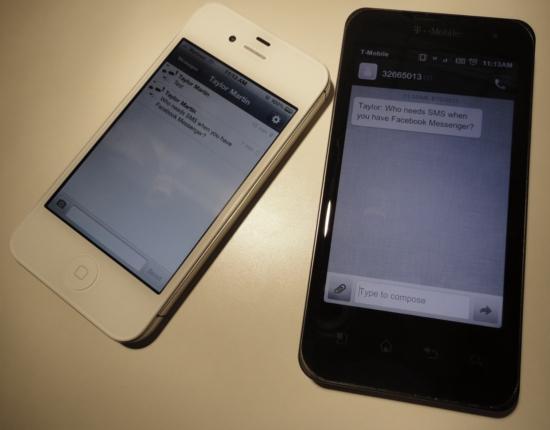
Voice calling is dying. It will never completely disappear as there will always be a need for a voice call on occasion. But as Robin Wauters of TechCrunch outlines in his article about why he is going to quit using voice calls completely, they interrupt at the worst times possible, there is no easy way to search, or forward a previously placed call and “Getting to the point is extremely hard for most people.” This is where alternative methods like text messaging and the various uses of data connectivity come in to play.
With SMS, you can reply at your own convenience, look back through your conversation with ease and most people like to get straight to the point – in 160 characters or less. The same can be accomplished via Twitter, Facebook and any other social media, or by using one of the hundred different instant messaging services available to most smartphone platforms.
The problem with text messaging, however, is that it is a paid feature. With AT&T and Verizon, customers pay $20 per month for unlimited text messages for an individual and $30 per month for unlimited texts for an entire family. Pricing isn't exactly outrageous, but text messaging should hardly be that expensive in comparison to data and voice calls. And, as we've covered many times before, other aspects of your bill may be going up. Prices on data plans are on the rise and unlimited data is becoming a thing of the past.
My question is, why are we still paying (so much) for text messaging? Your average text message is 1KB or less. If you send 5,000 text messages per month, you are only sending roughly 5MB per month in text messages, yet you likely pay $20 or $30. We cry and wail over rising data prices, but if you think about it, text messaging is where we're really taking the biggest hit.
Ever since I made the jump to a smartphone, I've been using instant messaging. I started with BlackBerry, so BBM became a staple in the way I communicated. It isn't too different from carrier-supported text messaging, but with sent and read receipts with each message, it has its benefits over SMS. Now that I primarily use Android and iOS, I've moved on to free, cross-platform services like Kik, Live Profile, etc. There is also iMessage, which is still in beta and definitely needs some work, and Facebook Messenger, that launched for Android and iOS and soared to be the top free app in App Store just yesterday.
There are obviously going to be people that do not have smartphones that you may want to text. But that isn't a problem either thanks to Facebook Messenger, which scans the address book on your phone and loads your Facebook contacts. Upon composing a new message and typing in the “To:” field, your friends will be filtered. If the friend is on Facebook and has their number on their profile, you will be asked how you want to send the message: as Facebook message or to their phone. Think of it as side-stepping carrier text messaging. Seeing as most people you know and talk to are likely on Facebook, this is the first real threat to SMS.
For all of you who are stuck with an enormous monthly bill due to expensive, tiered data, here is a chance for you to save some money each month on your bill. Try instant messaging for a month instead of SMS and see how it works. I'm considering it myself.
Also, do you think Facebook Messenger will pass with time, or is it here to stay? I've only used it for a few minutes, but I'm thoroughly impressed.